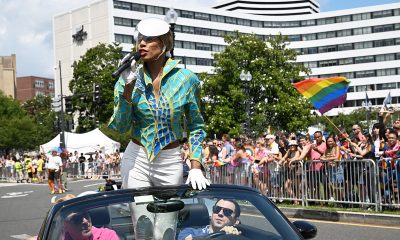homepage news
Vigil against anti-LGBT violence draws over 300 to Dupont Circle
City officials criticized for not approving funds for LGBT-related programs
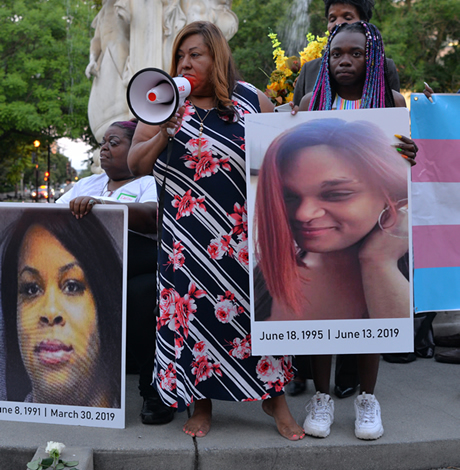
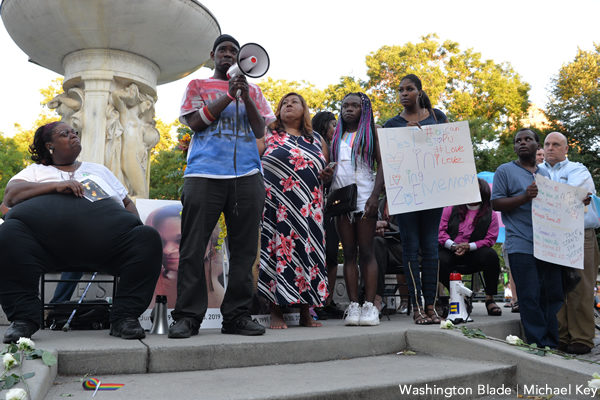
More than 300 people turned out in Dupont Circle Friday night for a vigil organized by LGBT activists in response to five separate incidents of violence against LGBT people in the D.C. area since June 13, including the murder of a transgender woman.
Several speakers at the vigil criticized D.C. Mayor Muriel Bowser and the D.C. Council for not approving or advocating for a request by a coalition of LGBT groups earlier this year for an additional $3.5 million in the city’s fiscal year 2020 budget for programs that activists say would address the underlying causes of anti-LGBT violence.
In a makeshift stage at the Dupont Circle fountain, vigil organizers placed a large poster size photo of 23-year old trans woman of color Zoe Spears, who was shot to death June 13 in Fairmount Heights, Md., just across the D.C. boarder at Eastern Avenue.
Organizers placed another poster size photo on the makeshift stage of another trans woman of color, Ashanti Carmon, who was shot to death on March 30 a few blocks from where Spears’ body was found in Fairmount Heights.
People who knew Spears and Carmon said the two were friends and that Spears told them she was present in the Fairmount Heights area where trans and cisgender female sex workers congregate when Carmon was gunned down.
Trans activist Ruby Corado, founder and executive director of the D.C. LGBT community services center Casa Ruby, told the crowd assembled around the fountain and the two large photos that Spears had been a Casa Ruby client and referred to Corado as “mom.”
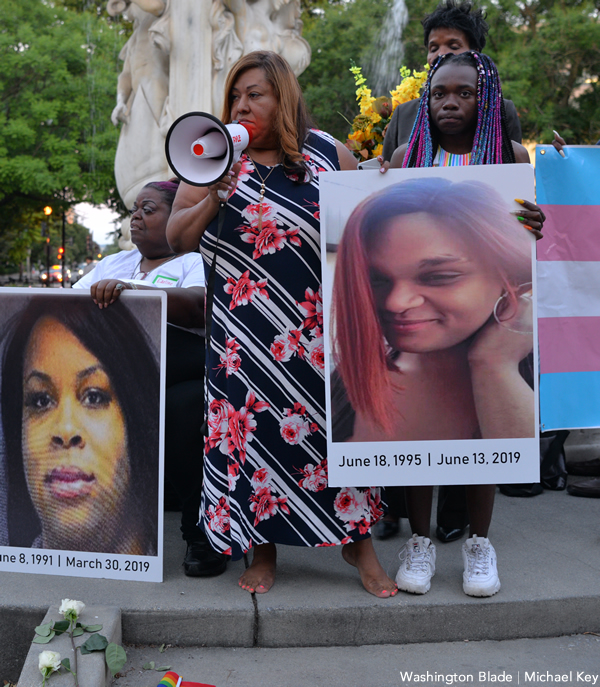
“I want you to look at Zoe’s picture,” Corado said. “This is one of the last pictures I took of her. I want you to look at her smile,” said Corado. “And I want to read her last message to me the week before she died. On Sunday at 12:48 p.m. she said, ‘Hey mom, I’m home … And I love you. Sweet dreams and by the way, happy birthday.’”
According to Corado, on the day before her death Spears sent her one last text message that Corado says she is still trying to understand. ‘Hey mom, can you shoot me $10 so I can eat?”
Corado and others who spoke at the vigil said Spears’ call for money so she could eat was symbolic of her struggle as a trans woman of color to find gainful employment and a sign that existing city programs may be failing trans people in need.
The second of the five incidents during the 6-day period last week involving anti-LGBT violence or threats of violence took place June 15 outside the Casa Ruby offices on Georgia Avenue, N.W. Three trans female Casa Ruby clients reported a man approached them in his car and displayed a gun in the parking lot of a restaurant across the street from Casa Ruby. The women fled the area without being harmed, according to Corado.
A D.C. police report of the incident says the same man a few minutes earlier was observed in the Casa Ruby parking lot by a male Casa Ruby employee. The report says the driver of the car told the employee, “I want my dick sucked, go get me one of those trannies.”
One day later, on June 16, Braden Brecht, 21, and his boyfriend, Karl Craven, 24, were attacked beaten, and robbed by a group of more than a dozen assailants on U Street, N.W., near the gay bar Nellie’s. The attack left Brecht with two broken teeth and stitches in his lip, which he received during a six-hour stay at MedStar Washington Hospital Center, he told the Washington Blade.
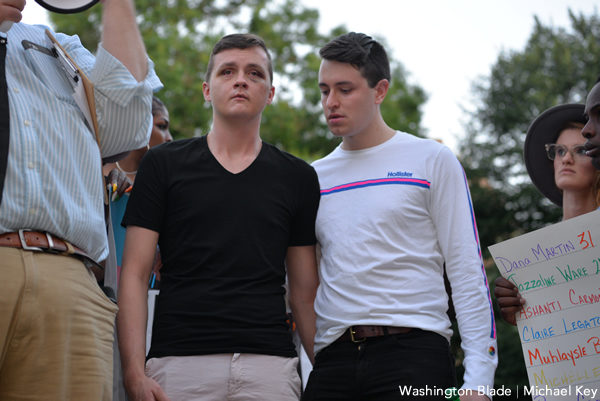
D.C. police, who listed the incident as a hate crime, made three arrests in the case, two juveniles and a 19-year old male identified as Marcus Britt of Fort Washington, Md. The U.S. Attorney’s Office, which prosecutes crimes committed by adults in the District, said it dropped the charge against Britt. A spokesperson said the office typically drops charges when evidence is insufficient to result in a conviction at trial.
The Office of the D.C. Attorney General, which prosecutes crimes committed by juveniles, has declined to say whether the charges are still pending against the two juveniles arrested in the attack against Brecht and Craven.
Also on June 16 D.C. police said three people were stabbed by one or more unidentified attackers inside the Dupont Circle gay bar Fireplace. Police released photos of two male suspects taken by a video surveillance camera and have asked the public for help in identifying the suspects. Police said the stabbings were the result of an argument between the suspects and victims. The injuries suffered by the victims were not life-threatening according to police.
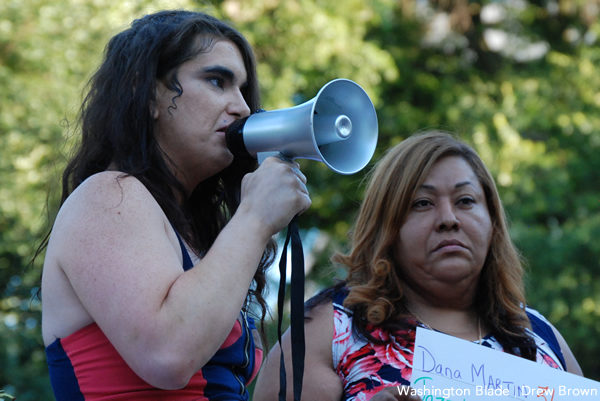
The last of the five recent incidents took place on June 18 when trans activist Emmelia Talarico was assaulted by one of three male suspects who shouted anti-LGBT slurs at her as she was attempting to leave a grocery store in the city’s Eckington neighborhood near where she lives.
A police report says Talarico wasn’t seriously injured. But she has said she and her roommates who live in a house operated by the LGBT and sex worker advocacy group No Justice No Pride became alarmed when one of the three suspects who harassed Talarico at the grocery store apparently followed her and a store employee who drove her home and threw rocks at her house after walking onto the front porch.
The report says someone called 911 and although police did not find the rock-throwing suspect, the incident remains under investigation.
Talarico was among several victims of anti-LGBT violence who spoke at the vigil. She faulted the mayor, the D.C. Council, and other public officials for not supporting the full decriminalization of sex work in the city between consenting adults, saying criminalization of sex work leads to violence against sex workers, including trans women of color involved in sex work.
“No more vigils,” she told the gathering. “We should be angry and screaming in the streets.”
Randy Downs, a gay Advisory Neighborhood Commissioner from Dupont Circle and a member of the recently formed Rainbow Caucus of LGBTQ ANC Commissioners, was among the vigil speakers who criticized the D.C. government for not adequately addressing issues the group said can lead to anti-LGBT violence.
Downs noted that the vigil was taking place two days after ANC Rainbow Caucus members sent a letter to D.C. Council Chair Phil Mendelson (D-At-Large) and other city government leaders calling for the additional funds in the city budget initially called for by 15 LGBT supportive groups earlier this year.
“Our government is failing us,” Downs said at the vigil. “We learned long ago that silence equals death,” he said. “And the silence and inaction of District leaders is killing members of our community or placing them in harm’s way and hospital emergency rooms.”
Added Downs: “We will not be complacent. We will not be silent. And we will hold every single elected leader accountable for their failures.”
Downs blamed the “inaction” of city leaders for some of the anti-LGBT incidents that occurred during the past two weeks, saying LGBT people are “dying of preventable causes” that can be remedied by government action.
“Words of friendship no longer ring true,” he said in referring to D.C. elected officials. “You can no longer march in our parade, throw beads and candy and then in the next week deny us funding and the resources we need. You can no longer march in our parade throwing beads and candy until you give us the resources we deserve.”
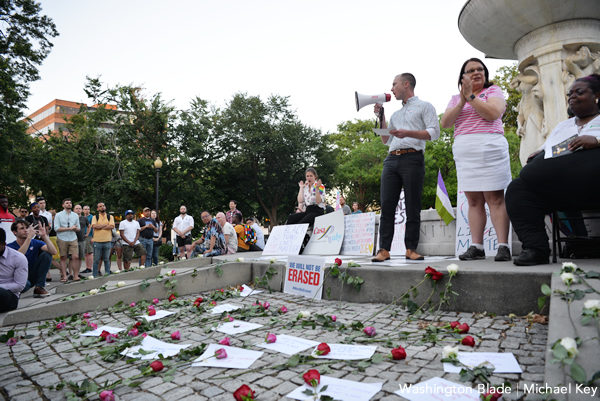
Veteran gay activist Rick Rosendall, former president of the D.C. Gay and Lesbian Activists Alliance, mentioned while speaking at the vigil that he saw Mendelson was present at the event as a supporter rather than a speaker.
Mendelson and LGBT activists have given conflicting accounts of whether the 15 organizations took adequate steps to inform Mendelson and the D.C. Council as a whole about the urgency of their request for the additional $3.5 million in the city’s budget. Mendelson told the Blade in a May 29 statement that he did not see an April 30 letter the advocacy groups said they sent him and his Council colleagues asking for the additional funds.,
“I, of course, would have been more supportive of the community’s call for more resources,” he said in his statement.
But activists familiar with the interaction with Mendelson and other Council members dispute Mendelson’s explanation, saying representatives of the groups testified before two Council hearings on budget related issues earlier this year, where they clearly asked for the additional $3.5 million in funds.
The activists say representatives of the groups calling for the additional funds had a follow-up meeting with Mendelson’s staff on May 9, where they further articulated the reasons they feel the additional funds were needed.
In her remarks at the vigil Corado said she, too, has made requests for city funds for a Casa Ruby employment assistance program for LGBT people in need, especially trans people. She said both the mayor and Council rebuffed her funding requests for that particular program, although she said Casa Ruby has received city funds for other programs.
Sheila Alexander Reid, director of the Mayor’s Office of LGBTQ Affairs, to which the activists want $3 million of the $3.5 million they are seeking to go, has not immediately responded to a request by the Blade seeking her and the mayor’s position on the activists’ request for the additional funds.
The groups seeking the funds want the Office of LGBTQ Affairs to use the additional $3 million for a community grants program to assist LGBT people in need.
In a statement released on the day of the vigil, Bowser said she stands with the LGBT community in its efforts to stop anti-LGBT violence.
“Washington, D.C. is a city of love, inclusivity, and diversity,” the mayor said. “As a community, we are proud to be guided and defined by those values, and when those values are attacked — when members of the LGBTQ community are harassed, hurt, or targeted in violent crimes in or near D.C. — it should cause every single member of our community to pause and reflect on how we can do better,” she said.
“Today and every day, we must stand together in rejecting bigotry, in doing more to support and protect trans women of color and in looking out for our LGBTQ youth and other vulnerable populations,” she said.
In a separate statement released on Friday D.C. Attorney General Karl Racine said he is committed to aggressively protecting the safety of the LGBT community against hate crimes and other forms of violence.
He said he wanted to make it clear that it was the U.S. Attorney’s Office and not his office that dropped the charge against the 19-year-old man arrested by D.C. police in the attack against Braden and Craven on U Street last week.
But he noted that due to D.C. laws restricting disclosure of information about juveniles charged with crimes he could not provide any information about the two juveniles D.C. police arrested in the attack on Brecht and Craven.
“That means we are not even allowed to disclose whether we are prosecuting a juvenile in a case,” he said.
A spokesperson for the Attorney General’s Office didn’t immediately respond to an inquiry from the Blade asking whether Racine would support changing the city’s juvenile justice laws to allow the disclosure of the disposition of criminal cases against juveniles without revealing the identity of a juvenile charged in such a case.
Others who spoke at the vigil on Friday were trans activists Gisselle Flores and Charmaine Eccles, D.C. Center for the LGBT Community Director David Mariner, Gertrude Stein Democratic Club President and trans activist Monika Nemeth, former GLAA president Rick Rosendall, Capital Pride Alliance President Ashley Smith and Christopher Massicotte of the LGBTQ Victory Fund.
Also speaking was Philip Williams, Ashanti Carmon’s fiancé, who drew loud shouts of support from the crowd as he struggled to overcome his emotions in describing how his life has changed since the woman he loved was murdered on March 30.
“I see couples today and I’m walking alone,” he said.
“We love you!” someone shouted from the crowd. “We are with you,” someone else called out to him.
Drawing similar shouts of support were U Street assault victims Brandon Brecht and Karl Craven, who did not speak but appeared on the makeshift stage after being introduced by D.C. Center director Mariner. The two told the Blade later they were still grappling with the trauma of being attacked and weren’t up to speaking, but they were moved by the love and support they received from the crowd.
“It’s the biggest crowd I’ve been around since it happened,” Brecht told the Blade. “So my anxiety is high but it’s an overwhelming amount of love and so that pushes past my anxiety.”
Trans activist Earline Budd served as moderator of the vigil. Opening and closing prayers were delivered by Bishop Allyson Abrams, Rev. Elder Dyan Akousa, and Rev. Alex Dyer.
The Gay Men’s Chorus of Washington received loud and prolonged applause after it sang the civil rights movement anthem “We Shall Overcome”.
homepage news
Honoring the legacy of New Orleans’ 1973 UpStairs Lounge fire
Why the arson attack that killed 32 gay men still resonates 50 years later

On June 23 of last year, I held the microphone as a gay man in the New Orleans City Council Chamber and related a lost piece of queer history to the seven council members. I told this story to disabuse all New Orleanians of the notion that silence and accommodation, in the face of institutional and official failures, are a path to healing.
The story I related to them began on a typical Sunday night at a second-story bar on the fringe of New Orleans’ French Quarter in 1973, where working-class men would gather around a white baby grand piano and belt out the lyrics to a song that was the anthem of their hidden community, “United We Stand” by the Brotherhood of Man.
“United we stand,” the men would sing together, “divided we fall” — the words epitomizing the ethos of their beloved UpStairs Lounge bar, an egalitarian free space that served as a forerunner to today’s queer safe havens.
Around that piano in the 1970s Deep South, gays and lesbians, white and Black queens, Christians and non-Christians, and even early gender minorities could cast aside the racism, sexism, and homophobia of the times to find acceptance and companionship for a moment.
For regulars, the UpStairs Lounge was a miracle, a small pocket of acceptance in a broader world where their very identities were illegal.
On the Sunday night of June 24, 1973, their voices were silenced in a murderous act of arson that claimed 32 lives and still stands as the deadliest fire in New Orleans history — and the worst mass killing of gays in 20th century America.
As 13 fire companies struggled to douse the inferno, police refused to question the chief suspect, even though gay witnesses identified and brought the soot-covered man to officers idly standing by. This suspect, an internally conflicted gay-for-pay sex worker named Rodger Dale Nunez, had been ejected from the UpStairs Lounge screaming the word “burn” minutes before, but New Orleans police rebuffed the testimony of fire survivors on the street and allowed Nunez to disappear.
As the fire raged, police denigrated the deceased to reporters on the street: “Some thieves hung out there, and you know this was a queer bar.”
For days afterward, the carnage met with official silence. With no local gay political leaders willing to step forward, national Gay Liberation-era figures like Rev. Troy Perry of the Metropolitan Community Church flew in to “help our bereaved brothers and sisters” — and shatter officialdom’s code of silence.
Perry broke local taboos by holding a press conference as an openly gay man. “It’s high time that you people, in New Orleans, Louisiana, got the message and joined the rest of the Union,” Perry said.
Two days later, on June 26, 1973, as families hesitated to step forward to identify their kin in the morgue, UpStairs Lounge owner Phil Esteve stood in his badly charred bar, the air still foul with death. He rebuffed attempts by Perry to turn the fire into a call for visibility and progress for homosexuals.
“This fire had very little to do with the gay movement or with anything gay,” Esteve told a reporter from The Philadelphia Inquirer. “I do not want my bar or this tragedy to be used to further any of their causes.”
Conspicuously, no photos of Esteve appeared in coverage of the UpStairs Lounge fire or its aftermath — and the bar owner also remained silent as he witnessed police looting the ashes of his business.
“Phil said the cash register, juke box, cigarette machine and some wallets had money removed,” recounted Esteve’s friend Bob McAnear, a former U.S. Customs officer. “Phil wouldn’t report it because, if he did, police would never allow him to operate a bar in New Orleans again.”
The next day, gay bar owners, incensed at declining gay bar traffic amid an atmosphere of anxiety, confronted Perry at a clandestine meeting. “How dare you hold your damn news conferences!” one business owner shouted.
Ignoring calls for gay self-censorship, Perry held a 250-person memorial for the fire victims the following Sunday, July 1, culminating in mourners defiantly marching out the front door of a French Quarter church into waiting news cameras. “Reverend Troy Perry awoke several sleeping giants, me being one of them,” recalled Charlene Schneider, a lesbian activist who walked out of that front door with Perry.

Esteve doubted the UpStairs Lounge story’s capacity to rouse gay political fervor. As the coroner buried four of his former patrons anonymously on the edge of town, Esteve quietly collected at least $25,000 in fire insurance proceeds. Less than a year later, he used the money to open another gay bar called the Post Office, where patrons of the UpStairs Lounge — some with visible burn scars — gathered but were discouraged from singing “United We Stand.”
New Orleans cops neglected to question the chief arson suspect and closed the investigation without answers in late August 1973. Gay elites in the city’s power structure began gaslighting the mourners who marched with Perry into the news cameras, casting suspicion on their memories and re-characterizing their moment of liberation as a stunt.
When a local gay journalist asked in April 1977, “Where are the gay activists in New Orleans?,” Esteve responded that there were none, because none were needed. “We don’t feel we’re discriminated against,” Esteve said. “New Orleans gays are different from gays anywhere else… Perhaps there is some correlation between the amount of gay activism in other cities and the degree of police harassment.”

An attitude of nihilism and disavowal descended upon the memory of the UpStairs Lounge victims, goaded by Esteve and fellow gay entrepreneurs who earned their keep via gay patrons drowning their sorrows each night instead of protesting the injustices that kept them drinking.
Into the 1980s, the story of the UpStairs Lounge all but vanished from conversation — with the exception of a few sanctuaries for gay political debate such as the local lesbian bar Charlene’s, run by the activist Charlene Schneider.
By 1988, the 15th anniversary of the fire, the UpStairs Lounge narrative comprised little more than a call for better fire codes and indoor sprinklers. UpStairs Lounge survivor Stewart Butler summed it up: “A tragedy that, as far as I know, no good came of.”
Finally, in 1991, at Stewart Butler and Charlene Schneider’s nudging, the UpStairs Lounge story became aligned with the crusade of liberated gays and lesbians seeking equal rights in Louisiana. The halls of power responded with intermittent progress. The New Orleans City Council, horrified by the story but not yet ready to take its look in the mirror, enacted an anti-discrimination ordinance protecting gays and lesbians in housing, employment, and public accommodations that Dec. 12 — more than 18 years after the fire.
“I believe the fire was the catalyst for the anger to bring us all to the table,” Schneider told The Times-Picayune, a tacit rebuke to Esteve’s strategy of silent accommodation. Even Esteve seemed to change his stance with time, granting a full interview with the first UpStairs Lounge scholar Johnny Townsend sometime around 1989.
Most of the figures in this historic tale are now deceased. What’s left is an enduring story that refused to go gently. The story now echoes around the world — a musical about the UpStairs Lounge fire recently played in Tokyo, translating the gay underworld of the 1973 French Quarter for Japanese audiences.
When I finished my presentation to the City Council last June, I looked up to see the seven council members in tears. Unanimously, they approved a resolution acknowledging the historic failures of city leaders in the wake of the UpStairs Lounge fire.
Council members personally apologized to UpStairs Lounge families and survivors seated in the chamber in a symbolic act that, though it could not bring back those who died, still mattered greatly to those whose pain had been denied, leaving them to grieve alone. At long last, official silence and indifference gave way to heartfelt words of healing.
The way Americans remember the past is an active, ongoing process. Our collective memory is malleable, but it matters because it speaks volumes about our maturity as a people, how we acknowledge the past’s influence in our lives, and how it shapes the examples we set for our youth. Do we grapple with difficult truths, or do we duck accountability by defaulting to nostalgia and bluster? Or worse, do we simply ignore the past until it fades into a black hole of ignorance and indifference?
I believe that a factual retelling of the UpStairs Lounge tragedy — and how, 50 years onward, it became known internationally — resonates beyond our current divides. It reminds queer and non-queer Americans that ignoring the past holds back the present, and that silence is no cure for what ails a participatory nation.
Silence isolates. Silence gaslights and shrouds. It preserves the power structures that scapegoat the disempowered.
Solidarity, on the other hand, unites. Solidarity illuminates a path forward together. Above all, solidarity transforms the downtrodden into a resounding chorus of citizens — in the spirit of voices who once gathered ‘round a white baby grand piano and sang, joyfully and loudly, “United We Stand.”

Robert W. Fieseler is a New Orleans-based journalist and the author of “Tinderbox: the Untold Story of the Up Stairs Lounge Fire and the Rise of Gay Liberation.”
homepage news
New Supreme Court term includes critical LGBTQ case with ‘terrifying’ consequences
Business owner seeks to decline services for same-sex weddings

The U.S. Supreme Court, after a decision overturning Roe v. Wade that still leaves many reeling, is starting a new term with justices slated to revisit the issue of LGBTQ rights.
In 303 Creative v. Elenis, the court will return to the issue of whether or not providers of custom-made goods can refuse service to LGBTQ customers on First Amendment grounds. In this case, the business owner is Lorie Smith, a website designer in Colorado who wants to opt out of providing her graphic design services for same-sex weddings despite the civil rights law in her state.
Jennifer Pizer, acting chief legal officer of Lambda Legal, said in an interview with the Blade, “it’s not too much to say an immeasurably huge amount is at stake” for LGBTQ people depending on the outcome of the case.
“This contrived idea that making custom goods, or offering a custom service, somehow tacitly conveys an endorsement of the person — if that were to be accepted, that would be a profound change in the law,” Pizer said. “And the stakes are very high because there are no practical, obvious, principled ways to limit that kind of an exception, and if the law isn’t clear in this regard, then the people who are at risk of experiencing discrimination have no security, no effective protection by having a non-discrimination laws, because at any moment, as one makes their way through the commercial marketplace, you don’t know whether a particular business person is going to refuse to serve you.”
The upcoming arguments and decision in the 303 Creative case mark a return to LGBTQ rights for the Supreme Court, which had no lawsuit to directly address the issue in its previous term, although many argued the Dobbs decision put LGBTQ rights in peril and threatened access to abortion for LGBTQ people.
And yet, the 303 Creative case is similar to other cases the Supreme Court has previously heard on the providers of services seeking the right to deny services based on First Amendment grounds, such as Masterpiece Cakeshop and Fulton v. City of Philadelphia. In both of those cases, however, the court issued narrow rulings on the facts of litigation, declining to issue sweeping rulings either upholding non-discrimination principles or First Amendment exemptions.
Pizer, who signed one of the friend-of-the-court briefs in opposition to 303 Creative, said the case is “similar in the goals” of the Masterpiece Cakeshop litigation on the basis they both seek exemptions to the same non-discrimination law that governs their business, the Colorado Anti-Discrimination Act, or CADA, and seek “to further the social and political argument that they should be free to refuse same-sex couples or LGBTQ people in particular.”
“So there’s the legal goal, and it connects to the social and political goals and in that sense, it’s the same as Masterpiece,” Pizer said. “And so there are multiple problems with it again, as a legal matter, but also as a social matter, because as with the religion argument, it flows from the idea that having something to do with us is endorsing us.”
One difference: the Masterpiece Cakeshop litigation stemmed from an act of refusal of service after owner, Jack Phillips, declined to make a custom-made wedding cake for a same-sex couple for their upcoming wedding. No act of discrimination in the past, however, is present in the 303 Creative case. The owner seeks to put on her website a disclaimer she won’t provide services for same-sex weddings, signaling an intent to discriminate against same-sex couples rather than having done so.
As such, expect issues of standing — whether or not either party is personally aggrieved and able bring to a lawsuit — to be hashed out in arguments as well as whether the litigation is ripe for review as justices consider the case. It’s not hard to see U.S. Chief Justice John Roberts, who has sought to lead the court to reach less sweeping decisions (sometimes successfully, and sometimes in the Dobbs case not successfully) to push for a decision along these lines.
Another key difference: The 303 Creative case hinges on the argument of freedom of speech as opposed to the two-fold argument of freedom of speech and freedom of religious exercise in the Masterpiece Cakeshop litigation. Although 303 Creative requested in its petition to the Supreme Court review of both issues of speech and religion, justices elected only to take up the issue of free speech in granting a writ of certiorari (or agreement to take up a case). Justices also declined to accept another question in the petition request of review of the 1990 precedent in Smith v. Employment Division, which concluded states can enforce neutral generally applicable laws on citizens with religious objections without violating the First Amendment.
Representing 303 Creative in the lawsuit is Alliance Defending Freedom, a law firm that has sought to undermine civil rights laws for LGBTQ people with litigation seeking exemptions based on the First Amendment, such as the Masterpiece Cakeshop case.
Kristen Waggoner, president of Alliance Defending Freedom, wrote in a Sept. 12 legal brief signed by her and other attorneys that a decision in favor of 303 Creative boils down to a clear-cut violation of the First Amendment.
“Colorado and the United States still contend that CADA only regulates sales transactions,” the brief says. “But their cases do not apply because they involve non-expressive activities: selling BBQ, firing employees, restricting school attendance, limiting club memberships, and providing room access. Colorado’s own cases agree that the government may not use public-accommodation laws to affect a commercial actor’s speech.”
Pizer, however, pushed back strongly on the idea a decision in favor of 303 Creative would be as focused as Alliance Defending Freedom purports it would be, arguing it could open the door to widespread discrimination against LGBTQ people.
“One way to put it is art tends to be in the eye of the beholder,” Pizer said. “Is something of a craft, or is it art? I feel like I’m channeling Lily Tomlin. Remember ‘soup and art’? We have had an understanding that whether something is beautiful or not is not the determining factor about whether something is protected as artistic expression. There’s a legal test that recognizes if this is speech, whose speech is it, whose message is it? Would anyone who was hearing the speech or seeing the message understand it to be the message of the customer or of the merchants or craftsmen or business person?”
Despite the implications in the case for LGBTQ rights, 303 Creative may have supporters among LGBTQ people who consider themselves proponents of free speech.
One joint friend-of-the-court brief before the Supreme Court, written by Dale Carpenter, a law professor at Southern Methodist University who’s written in favor of LGBTQ rights, and Eugene Volokh, a First Amendment legal scholar at the University of California, Los Angeles, argues the case is an opportunity to affirm the First Amendment applies to goods and services that are uniquely expressive.
“Distinguishing expressive from non-expressive products in some contexts might be hard, but the Tenth Circuit agreed that Smith’s product does not present a hard case,” the brief says. “Yet that court (and Colorado) declined to recognize any exemption for products constituting speech. The Tenth Circuit has effectively recognized a state interest in subjecting the creation of speech itself to antidiscrimination laws.”
Oral arguments in the case aren’t yet set, but may be announced soon. Set to defend the state of Colorado and enforcement of its non-discrimination law in the case is Colorado Solicitor General Eric Reuel Olson. Just this week, the U.S. Supreme Court announced it would grant the request to the U.S. solicitor general to present arguments before the justices on behalf of the Biden administration.
With a 6-3 conservative majority on the court that has recently scrapped the super-precedent guaranteeing the right to abortion, supporters of LGBTQ rights may think the outcome of the case is all but lost, especially amid widespread fears same-sex marriage would be next on the chopping block. After the U.S. Tenth Circuit Court of Appeals ruled against 303 Creative in the lawsuit, the simple action by the Supreme Court to grant review in the lawsuit suggests they are primed to issue a reversal and rule in favor of the company.
Pizer, acknowledging the call to action issued by LGBTQ groups in the aftermath of the Dobbs decision, conceded the current Supreme Court issuing the ruling in this case is “a terrifying prospect,” but cautioned the issue isn’t so much the makeup of the court but whether or not justices will continue down the path of abolishing case law.
“I think the question that we’re facing with respect to all of the cases or at least many of the cases that are in front of the court right now, is whether this court is going to continue on this radical sort of wrecking ball to the edifice of settled law and seemingly a goal of setting up whole new structures of what our basic legal principles are going to be. Are we going to have another term of that?” Pizer said. “And if so, that’s terrifying.”
homepage news
Kelley Robinson, a Black, queer woman, named president of Human Rights Campaign
Progressive activist a veteran of Planned Parenthood Action Fund

Kelley Robinson, a Black, queer woman and veteran of Planned Parenthood Action Fund, is to become the next president of the Human Rights Campaign, the nation’s leading LGBTQ group announced on Tuesday.
Robinson is set to become the ninth president of the Human Rights Campaign after having served as executive director of Planned Parenthood Action Fund and more than 12 years of experience as a leader in the progressive movement. She’ll be the first Black, queer woman to serve in that role.
“I’m honored and ready to lead HRC — and our more than three million member-advocates — as we continue working to achieve equality and liberation for all Lesbian, Gay, Bisexual, Transgender, and Queer people,” Robinson said. “This is a pivotal moment in our movement for equality for LGBTQ+ people. We, particularly our trans and BIPOC communities, are quite literally in the fight for our lives and facing unprecedented threats that seek to destroy us.”
The next Human Rights Campaign president is named as Democrats are performing well in polls in the mid-term elections after the U.S. Supreme Court overturned Roe v. Wade, leaving an opening for the LGBTQ group to play a key role amid fears LGBTQ rights are next on the chopping block.
“The overturning of Roe v. Wade reminds us we are just one Supreme Court decision away from losing fundamental freedoms including the freedom to marry, voting rights, and privacy,” Robinson said. “We are facing a generational opportunity to rise to these challenges and create real, sustainable change. I believe that working together this change is possible right now. This next chapter of the Human Rights Campaign is about getting to freedom and liberation without any exceptions — and today I am making a promise and commitment to carry this work forward.”
The Human Rights Campaign announces its next president after a nearly year-long search process after the board of directors terminated its former president Alphonso David when he was ensnared in the sexual misconduct scandal that led former New York Gov. Andrew Cuomo to resign. David has denied wrongdoing and filed a lawsuit against the LGBTQ group alleging racial discrimination.

-

 U.S. Supreme Court2 days ago
U.S. Supreme Court2 days agoSupreme Court to consider bans on trans athletes in school sports
-

 Out & About2 days ago
Out & About2 days agoCelebrate the Fourth of July the gay way!
-

 Virginia2 days ago
Virginia2 days agoVa. court allows conversion therapy despite law banning it
-

 Maryland4 days ago
Maryland4 days agoLGBTQ suicide prevention hotline option is going away. Here’s where else to go in Md.

